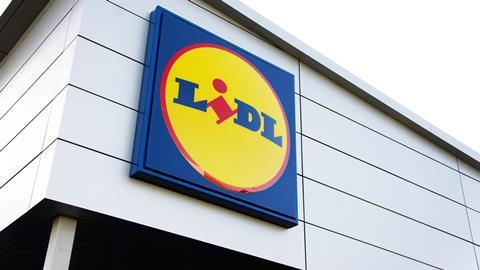Tesco has undervalued the damage it did to the Lidl brand by its use of a blue and yellow logo to promote prices promotions, the High Court heard yesterday.
The hearing, at the Rolls building before Mrs Justice Joanna Smith DBE, heard that Lidl is seeking financial disclosure from Tesco so it can calculate what profits were made from its infringement of Lidl’s copyright.
Both parties agreed to try and resolve the issue of what documentation Tesco has available for disclosure so that Lidl can make a decision on its next steps.
The hearing follows Lidl’s win against Tesco over the latter’s Clubcard prices promotional imagery. The judgment found in favour of Lidl’s claims of trade mark and copyright infringement over the yellow circle and blue square but in favour of Tesco on its counterclaim of bad faith.
At yesterday’s hearing, Benet Brandreth KC, for Lidl, said: ‘They [Tesco] undervalue the damage to the Lidl brand and the benefit to them of the infringement. They ignore the impact on consumers and they overstate costs of compliance. My client at a very early stage said "we do not need any money, please just stop and you can have time to do it [change the imagery]" and they said no. They should lie in the bed that they made.’
Referring to the ‘significant’ damage caused by the infringement, Brandreth told the court that Lidl licenses its brands. When doing so it values them as a 'percentage of its turnover’, Lidl’s skeleton argument states.
Brandreth said: ‘If you apply that licence approach to Tesco’s astonishingly large turnover…even a small percentage of a very large number is still a very large number.’
The court heard that the parties are in agreement over an injunction in relation to the previous judgment of trade mark infringement.
Hugo Cuddigan KC, for Tesco, said: ‘The copyright infringement is only concerned with the sign and labour of the artist. You look at the market price for that day [when the work was shown to the board], you do not look at reputation, that is represented by a different tort.’
He added: ‘This injunction or the crafting of this injunction has to reflect the finding of My Lady’s judgment, that Tesco has infringed but the changing of economic behaviour was limited. It was not [found that] everybody is confused or it has been a maelstrom of a problem, it was marginal. That has to be borne in mind when crafting the injunction.’
Lidl and Tesco also sought permission to appeal parts of the judgment, which was refused by Smith. Both retailers can apply directly to the Court of Appeal.
This article is now closed for comment.

























6 Readers' comments